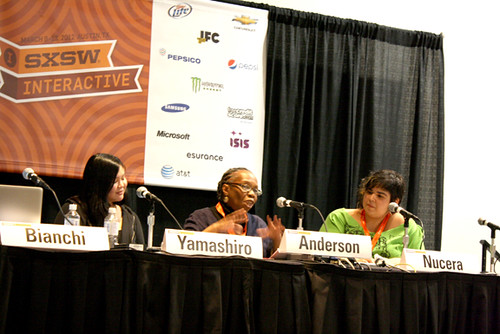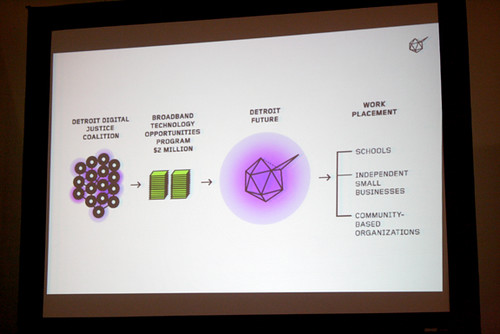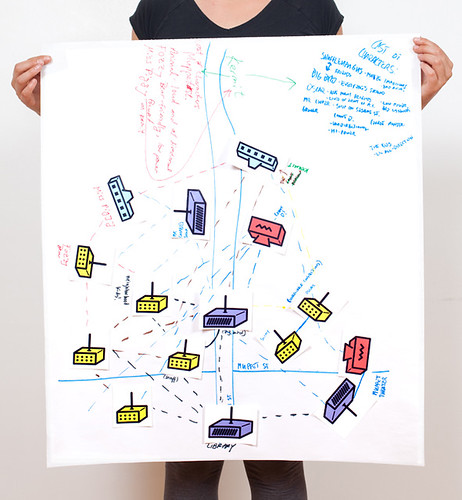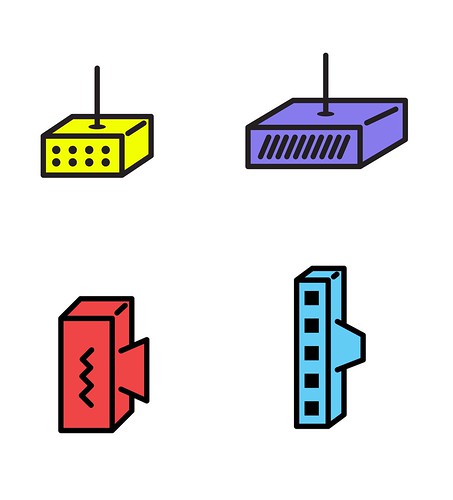OTI partners from the DDJC report back from SXSW
Blog Post
March 30, 2012
by Nina Bianchi and Mike Medow of the Detroit Digital Justice Coalition and the Allied Media Projects
“When they built the interstate highways through Detroit, they divided neighborhoods and paved a path to the suburbs. When we look at the digital divide, we see the information superhighway is doing the same thing: setting communities apart and giving the more affluent a path to abandon the city. For all of the Internet’s power to unite those of us who use it, how can we ensure that it does not divide us from those who don’t?” - excerpt from Detroit: A Media-Based Economy panel description, 2012 SXSW Interactive
On Monday, March 12, 2012 members of the Detroit Digital Justice Coalition presented “Detroit Future: A Media-Based Economy” at the 2012 SXSW Interactive Conference in Austin, Texas. Our panel aimed to move the conversation beyond the “information highway” metaphor, and to consider how the digital equivalents of streets, sidewalks, bike paths, and parks can strengthen social bonds within a community, making it safer and healthier, even wealthier. We offered stories of our local programs as examples of these community pathways.
Panelists included Detroit Digital Justice Coalition members Diana Nucera, Mike Medow, and Janel Yamashiro from Allied Media Projects, Rhonda Anderson from the Sierra Club’s Environmental Justice Project, and Nina Bianchi of The Work Department. Joshua Breitbart of the Open Technology Initiative and Jenny Lee of Allied Media Projects, while not able to attend, contributed framing ideas and language for the panel.
We shared the story of the Detroit Digital Justice Coalition and the Detroit Future initiative, which aims to address our city’s digital divide by cultivating a healthy digital ecology based on the principles of Healthy Communities, Common Ownership, Access, and Participation. While most SXSWi panels centered around themes of technology industry, consumer products, and marketing, the Detroit Future panel stood out for its focus on sustainable and ethical processes for community engagement with online technologies. We asked the 70 or so people attending the presentation if anyone was from Detroit or its diaspora and about 80% of attendees raised their hands. Of the over 20,000 people who attended SXSWi, we happily found ourselves in a room full of people with a personal stake in building a media economy for Detroit’s future.
We shared the story of the Detroit Future program, which runs media workshops, in-school programming, and youth programming with the support of a $1.8 million grant in ARRA stimulus funds from the Broadband Technology Opportunities Program. The Detroit Future initiative builds the capacity of educators, community organizers, artists, technologists, and small businesses to build just and creative forms of education and economic development in Detroit. Through Detroit Future, we use media and technology to create a shift in the way our communities think about the future of our economic, educational, environmental, and governing systems.
Detroit community organizer Rhonda Anderson energized the panel with her presentation on the founding of Detroit Digital Justice Coalition. She spoke about the organizing legacy of the environmental justice principles of 1991, which directly inspired the creation of digital justice principles in 2010. Rhonda spoke about how access to media and technology supports communities in re-imagining themselves, and helps them organize to make real their visions for social change.
We shared our practice of “DiscoTechs,” short for Discovering Technology, which are multimedia neighborhood workshop fairs that facilitate collaborative teaching and learning. These events provide a positive and hopeful experience for everyone, and attendees range from youth to seniors. Through the DiscoTech organizing process we don’t have to wait for others to provide solutions, but we get hands-on experience exploring the use of technology hardware and digital communications, which can then be used in the community to create solutions. We have designed and are documenting the DiscoTech model so that other communities can host similar community technology fairs. We shared images and a Michigan Public Radio story about our most recent DiscoTech at the Mt. Elliott Makerspace at the Church of the Messiah on Detroit's Eastside.
We also discussed Detroit’s emerging community wireless networks, which are designed to be flexible and scalable to meet diverse community needs. We shared some of our open source educational platforms to support community-driven network design and governance. For example, as part of our Neighborhood Planning Platform, the “Link Up Kit” explains the purpose of community wireless networks and illustrates where to place individual mesh routers. The kit uses an accessible visual language that appeals to residents with a range of technical skills. A sample application of the Link Up Kit includes a collaborative game called ‘Every Network Tells a Story’ where participants design mesh networks following community-based narratives.
Finished boards
Basic routers
Sample kit
We fielded audience questions on our relationships with the private sector and local government, and our sustainability model for our programs. At the conclusion of our 60-minute presentation we encouraged attendees interested in continuing this conversation to join us at the Allied Media Conference in Detroit from June 28 - July 1, 2012 for our yearly meet-up of Digital Justice Coalitions from around the country.
The full presentation slideshow can be downloaded here.
Shar McLeod from The Michigan Citizen, a Detroit-based, progressive newspaper, also covered our presentation. The story can be read here.




